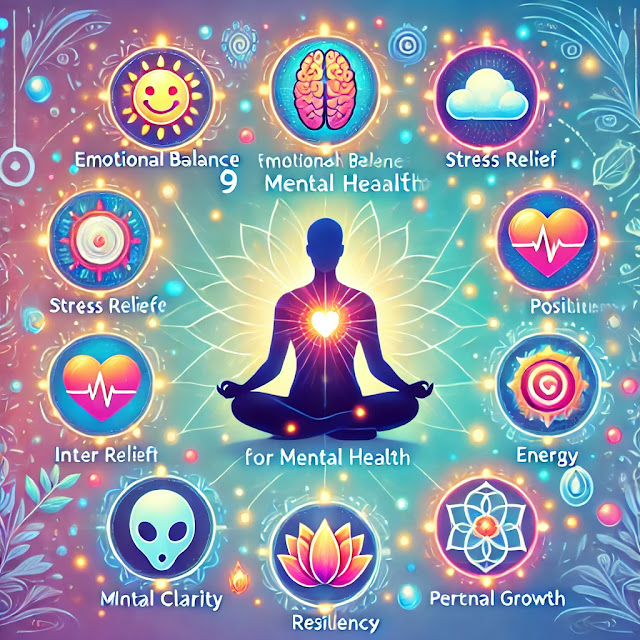In today's fast paced and ever changing global landscape, safeguarding your mental well-being is more important than ever. Amid the myriad techniques for achieving mental clarity and emotional balance, meditation shines as a proven, timeless solution. This guide uncovers the scientifically-backed benefits of meditation while providing actionable tips to seamlessly integrate this practice into your lifestyle. Whether your goal is to alleviate stress, elevate emotional resilience, or unlock peak cognitive performance, meditation serves as a comprehensive and accessible pathway to holistic well-being. Explore how this ancient practice can transform your life and become an essential tool in your personal growth journey.
 |
| 9 Meditation Benefits for Mental Health |
9 Proven Benefits of Meditation for Mental Health
1. Stress Reduction
Meditation is a scientifically proven stress-management tool
that helps lower cortisol levels and counteract the harmful effects of chronic
stress. By activating the body’s relaxation response, meditation reduces
activity in the amygdala—the brain’s “fight-or-flight” center—leading to a
state of calm and improved well-being. Whether you’re looking for effective
stress relief techniques or ways to manage daily anxiety, meditation offers a
practical solution.
2. Enhanced Emotional Well-Being
Regular meditation enhances emotional health by fostering
self-awareness and emotional regulation. It boosts feelings of happiness and
empathy while improving resilience against stressors. Studies confirm that
meditation cultivates emotional intelligence, helping individuals build
stronger relationships and navigate life’s challenges with greater ease.
Explore mindfulness techniques to enhance your emotional well-being today.
3. Improved Focus and Concentration
Meditation sharpens mental clarity by training the mind to
focus and boosting attention span. Mindfulness meditation, in particular,
enhances cognitive performance, supported by studies that show increased gray
matter in brain regions associated with attention and self-control. For those
looking to improve productivity and mental acuity, meditation provides
unparalleled benefits.
4. Strengthened Mind-Body Connection
Meditation strengthens the mind-body connection by promoting
holistic health practices such as mindful breathing and yoga. These techniques
foster awareness of bodily sensations, releasing physical tension and improving
overall balance. Embrace practices that harmonize your physical and mental
health to experience true wellness.
5. Better Sleep Quality
Meditation effectively combats sleep disorders by calming an
overactive mind. Mindfulness meditation helps treat insomnia and improves sleep
quality by signaling the body to relax. Establishing a pre-sleep meditation
routine promotes a smoother transition to restful sleep, making meditation a must-try
for better rest.
6. Anxiety and Depression Management
As a complementary therapy, meditation helps manage symptoms
of anxiety and depression. Mindfulness-based practices provide tools to
navigate these challenges by fostering a non-judgmental awareness of thoughts
and feelings. If you’re searching for natural remedies to support mental
health, meditation is a scientifically supported option.
7. Cognitive Enhancement and Brain Resilience
Meditation boosts brain health by enhancing neuroplasticity,
improving memory, learning, and cognitive performance. Regular practice
increases hippocampal volume, which may slow age-related cognitive decline and
support long-term mental acuity. Enhance your brain health and cognitive
resilience with daily meditation exercises.
8. Mindfulness Training
Mindfulness, a cornerstone of meditation, promotes
present-moment awareness without judgment. This heightened state of
consciousness enhances emotional stability and enriches daily interactions,
boosting overall life satisfaction. Incorporate mindfulness practices into your
routine for a more fulfilling and balanced life.
9. Resilience to Life’s Challenges
Meditation enhances resilience by fostering emotional
regulation and adaptability. Regular practice strengthens the prefrontal
cortex, enabling calm and rational responses to stressors while encouraging a
growth mindset toward setbacks. Discover how meditation can transform your
perspective on challenges and foster long-term well-being.
How to Get Started with Meditation
If you’re ready to embrace the benefits of meditation, check
out our guide on Yoga Poses for Stress Relief and Mental Wellness.
Whether you prefer guided apps, group classes, or self-directed sessions,
there’s a method for everyone. Start with just five minutes a day and gradually
expand your practice as you grow more comfortable. Explore resources to find
the best meditation techniques tailored to your lifestyle.
Final Thoughts
According to the National Health Interview Survey in US, Meditation has rapidly gained popularity for its mental health benefits, with the percentage of US adults practicing it doubling from 7.5% in 2002 to 17.3% in 2022,. It outpaces other wellness practices like yoga (15.8%) and chiropractic care (11%). In 2017, 5.4% of US children also practiced meditation.
Why is mindfulness meditation so popular? A 2012 survey of 34,525 adults found that 73% practiced it for general wellness and disease prevention, while 92% used it to relax or reduce stress. Additionally, over half of participants meditated to improve sleep quality.
Mindfulness meditation offers powerful benefits for mental
health, including stress relief, better sleep, and overall wellness. Whether
you're looking to improve sleep with meditation or seeking mindfulness
meditation for stress relief, the practice helps foster emotional well-being.
With growing awareness, more people are turning to meditation for general
wellness and meditation statistics 2022 for insights on how to incorporate it
into their lives for mental clarity and emotional health.





0 Comments
If you have any doubts, please let me know